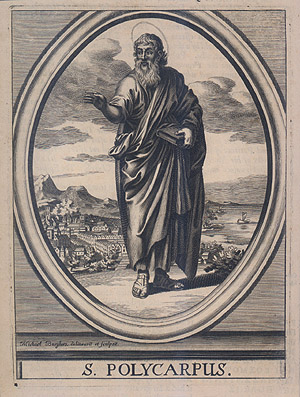|
Pseudo-Barnabas
Pseudo-Barnabas usually refers to the ''Epistle of Barnabas'' and to its author, who is considered an Apostolic Father, but whom most modern scholars judge not to be St. Barnabas. Sometimes "Pseudo-Barnabas" refers to the ''Gospel of Barnabas The Gospel of Barnabas is a Biblical apocrypha, non-canonical, Pseudepigrapha, pseudepigraphical gospel, written during the Late Middle Ages and attributed to the early Christian disciple Barnabas, who (in this work) is one of the Apostles in ...'', which most scholars consider to be a late medieval work, post-1300. The '' Acts of Barnabas'' is yet another pseudepigraphical work attributed to the name Barnabas. References Christian writers {{Bible-stub ... [...More Info...] [...Related Items...] OR: [Wikipedia] [Google] [Baidu] |
Epistle Of Barnabas
The Epistle of Barnabas () is an early Christian Greek epistle written between AD 70 and AD 135. The complete text is preserved in the 4th-century Codex Sinaiticus, where it appears at the end of the New Testament, following the Book of Revelation and before the Shepherd of Hermas. For several centuries, it was one of the "antilegomena" ("disputed") writings that some Christians looked at as sacred scripture, while others excluded them. Eusebius of Caesarea classified it with excluded texts. It is mentioned in a perhaps third-century list in the sixth-century Codex Claromontanus and in the later Stichometry of Nicephorus appended to the ninth-century ''Chronography'' of Nikephoros I of Constantinople. Some early Fathers of the Church ascribed it to the Barnabas mentioned in the Acts of the Apostles, but it is now generally attributed to an otherwise unknown early Christian teacher (though some scholars do defend the traditional attribution). It is distinct from the Gospel of B ... [...More Info...] [...Related Items...] OR: [Wikipedia] [Google] [Baidu] |
Apostolic Father
The Apostolic Fathers, also known as the Ante-Nicene Fathers, were core Christian theologians among the Church Fathers who lived in the 1st and 2nd centuries AD who are believed to have personally known some of the Twelve Apostles or to have been significantly influenced by them. Their writings, though widely circulated in early Christianity, were not included in the canon of the New Testament. Many of the writings derive from the same time period and geographical location as other works of early Christian literature which came to be part of the New Testament. Background The label ''Apostolic Fathers'' has been applied to these writers only since the 17th century, to indicate that they were thought of as representing the generation that had personal contact with the Twelve Apostles. The earliest known use of the term "Apostolic(al) Fathers" was by William Wake in 1693, when he was chaplain in ordinary to King William and Queen Mary of England. According to the ''Catholic Encycl ... [...More Info...] [...Related Items...] OR: [Wikipedia] [Google] [Baidu] |
Gospel Of Barnabas
The Gospel of Barnabas is a Biblical apocrypha, non-canonical, Pseudepigrapha, pseudepigraphical gospel, written during the Late Middle Ages and attributed to the early Christian disciple Barnabas, who (in this work) is one of the Apostles in the New Testament, apostles of Jesus. It is about the same length as the four canonical gospels combined and largely harmonizes stories in the canonical gospels with Jesus in Islam, Islamic elements such as the Islamic views on Jesus' death, denial of Jesus' crucifixion. The gospel presents a detailed account of the life of Jesus. It begins with the nativity of Jesus, which includes the annunciation by the archangel Gabriel to Mary, mother of Jesus, Mary which precedes Virgin birth of Jesus, Jesus' birth. The gospel follows ministry of Jesus, his ministry, ending with the Great Commission, message of Jesus to spread his teachings around the world. Judas Iscariot replaced Jesus at the Crucifixion of Jesus, crucifixion. The gospel survives i ... [...More Info...] [...Related Items...] OR: [Wikipedia] [Google] [Baidu] |
Acts Of Barnabas
The Acts of Barnabas is a non-canonical pseudepigraphical Christian work that claims to identify its author as John Mark, the companion of Paul the Apostle, as if writing an account of Barnabas, the Cypriot Jew who was a member of the earliest church of Jerusalem; through the services of Barnabas, the convert Saul was welcomed into the apostolic community. Three pseudepigraphical works are linked with the name of Barnabas: the ''Epistle of Barnabas'', written between AD 70 and 135, this ''Acts'' and the medieval text ''Gospel of Barnabas''. None of them have been accepted into the biblical canon. Text The language and the ecclesiastical politics of ''Acts of Barnabas'' reveal it to be a work of the 5th century, designed to strengthen the claims of the Church of Cyprus to apostolic foundation as the site of Barnabas' grave, and therefore of its bishops' independence from the patriarch of Antioch. These are 5th century concerns, the independence of the Church of Cyprus having be ... [...More Info...] [...Related Items...] OR: [Wikipedia] [Google] [Baidu] |


